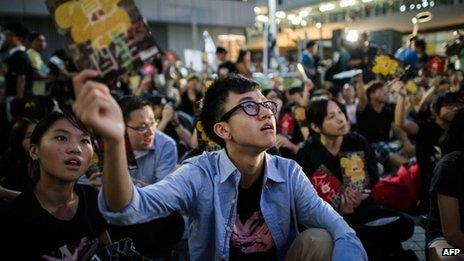Hong Kong and China: Growing apart?
- Published

Fifteen years after the handover of Hong Kong, the new Chinese leadership in Beijing is getting increasingly nervous about the former colony's independent-mindedness.
A senior Chinese official in charge of Hong Kong affairs, Zhang Xiaoming, has accused "external powers" - presumably Britain and the US - of helping opposition parties in Hong Kong.
Writing in Hong Kong's pro-Beijing newspaper Wen Wei Po, Mr Zhang insisted that new legislation was required to stop any such interference.
This has caused fury among the politicians and activists known as "pan-democrats" in Hong Kong. Many believe that a crisis between Beijing and Hong Kong is building up.
When outgoing Chinese President Hu Jintao visited Hong Kong in July, he was greeted by people demonstrating against what they saw as efforts to remake the territory in China's own image.
Some of the demonstrators turned up with the old colonial flag, which had the Union Jack in the top left-hand corner.
'We are Hong Kongese'
The people who brandished the flag were all were young Hong Kong Chinese. Few if any can have been in their teens when Hong Kong was handed over to China.
They were not demanding a return to British rule - instead they were emphasising the separateness of Hong Kong. But they saw the flag as the symbol of their distinctive existence, and of the protection which the British authorities used to give them.
In Victoria Park - all the old British-era names have been retained in Hong Kong - I met one of the organisers of the flag protest, Danny Chan. He is only 26.
"We aren't British, and we aren't Chinese," he told me. "We are Hong Kongese, and we want to stay that way."
In September there was a fresh cause for anger. The Chinese government wanted Hong Kong schools and universities to start teaching the Chinese version of history, in particular to give a favourable account of the Chinese Communist Party.
The demonstrations, at which the colonial flag was again waved with great enthusiasm by some of the protesters, were so big and so intense that the local Hong Kong government caved in and agreed not to introduce the new lessons.
Fifteen years ago, this kind of independent-mindedness on the part of Hong Kong's people seemed unthinkable.
I reported for the BBC on the handover in June 1997, and at that stage it seemed fair to assume that Hong Kong would swiftly be submerged in a greater China.
The people of Hong Kong had always gone along quietly enough with their colonial rulers, and it seemed only reasonable that they would now go along with their Communist ones.
Growing apart?
At midnight on 30 June 1997, after the final ceremony of the handover had taken place, the royal yacht Britannia sailed out of Victoria Harbour, brilliantly lit and taking the Prince of Wales and the last Hong Kong Governor, Chris Patten, with her.
I was invited to a celebratory cocktail party given by the Chinese government. The windows of the Convention Centre, where it was held, looked out at Britannia as she made her way to the sea.
But the Hong Kong businessmen at the party ostentatiously kept their backs turned to the historic sight below them.
I felt at the time that it was a sign of the way things were going in Hong Kong. And yet, 15 years later, it has turned out very differently.
Now there is a new fear - that China will feel it has to step in and do something about this growing sense of differentiation between Hong Kong and the mainland.
In 2017, if things go according to plan, the chief executive in Hong Kong - in effect its prime minister - will be popularly elected. At the moment Beijing nominates a senior Hong Kong figure for the job.
China is clearly worried that if the chief minister is elected, this will encourage a greater sense of independence among Hong Kong people. Many pan-democrats are afraid that China is looking for ways to postpone it, or even stop it altogether.
Everything depends on the attitude of the new leadership which has taken over in Beijing.
Zhang Xiaoming's article in the Hong Kong press, blaming it all on "outside powers", is not a good omen.
- Published22 November 2012
- Published10 September 2012
- Published9 September 2012
- Published1 July 2012
- Published8 September 2012
- Published4 September 2023